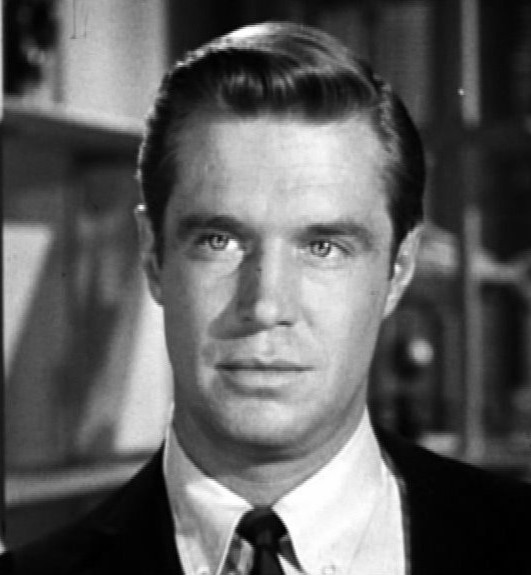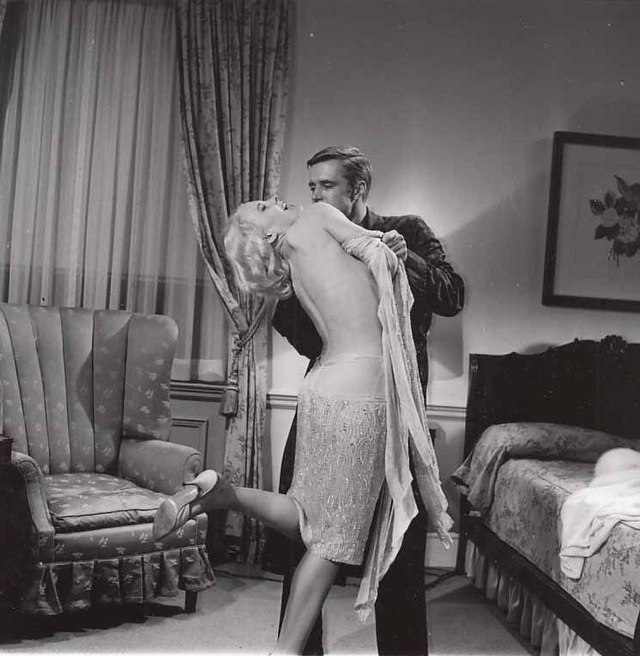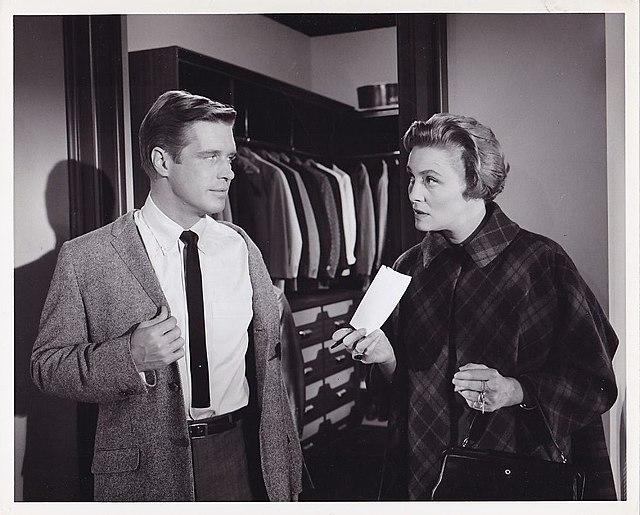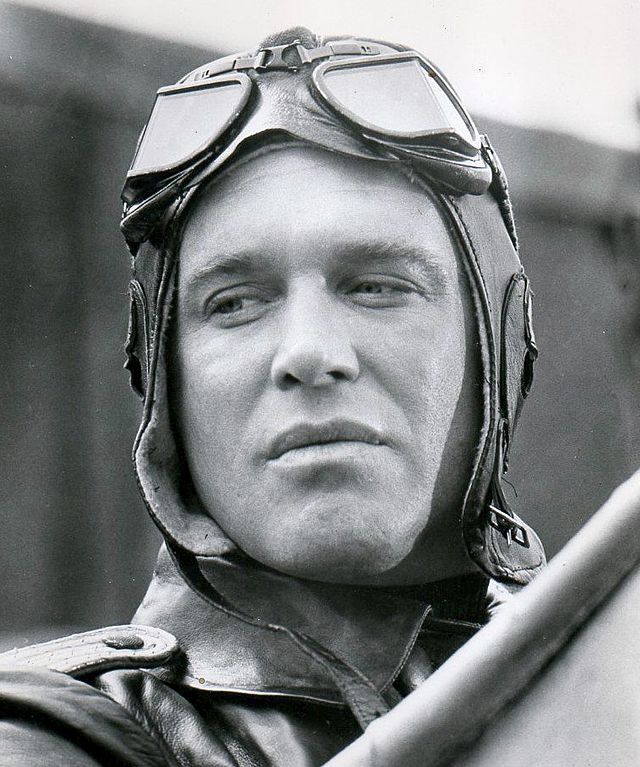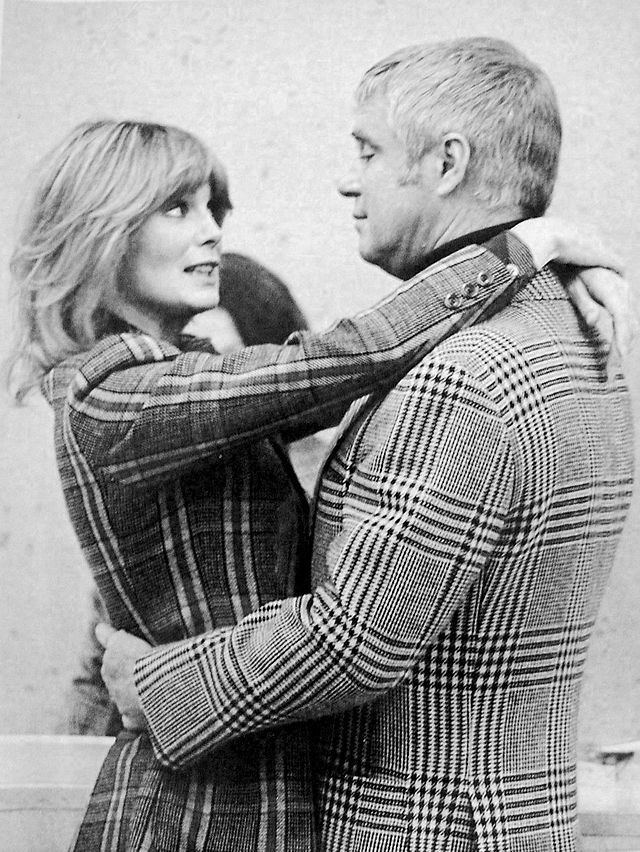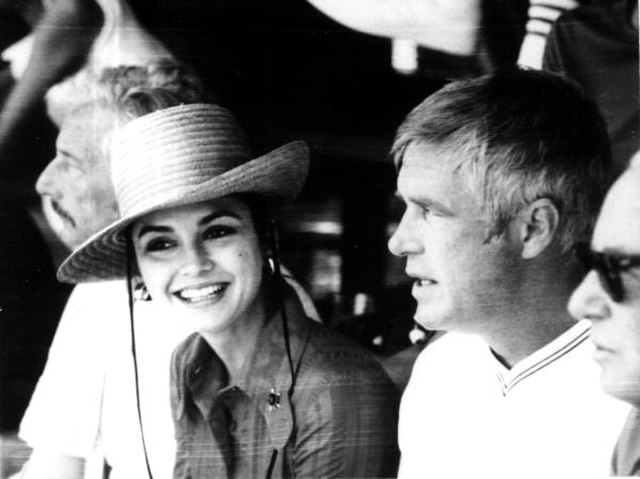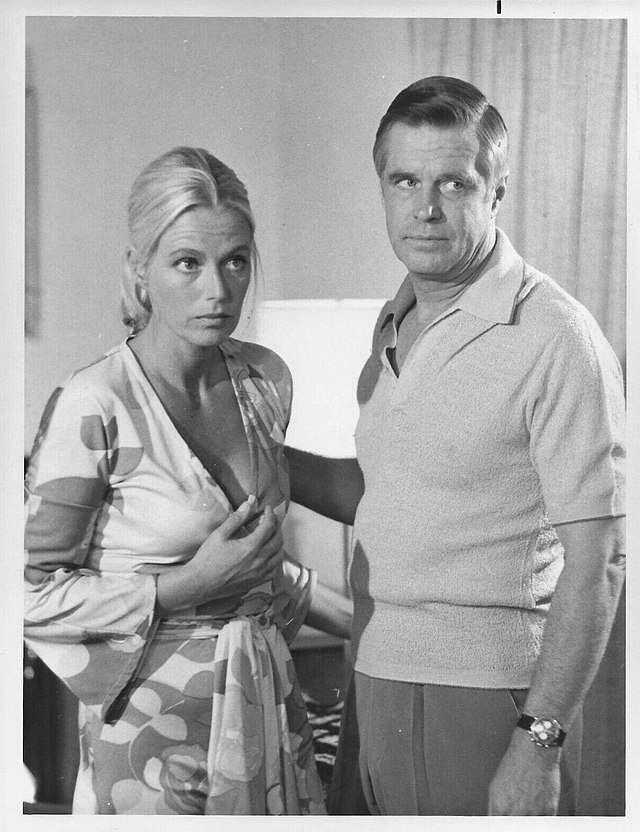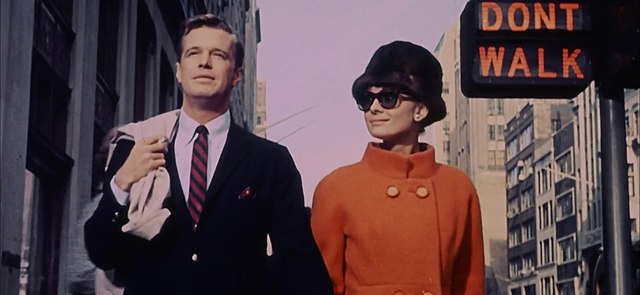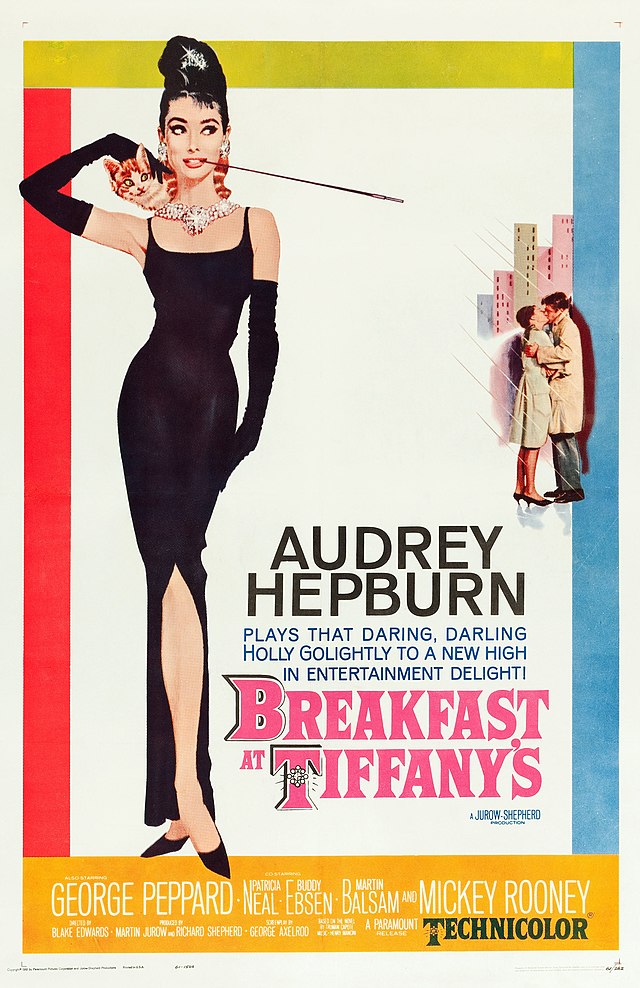George Peppard
back| Full Name | George William Peppard Jr. |
| Stage Name | George Peppard |
| Born | October 1, 1928 |
| Birthplace | Detroit, Michigan, USA |
| Died | May 8, 1994 |
| Buried | Northview Cemetery, Dearborn, Michigan, USA |
| Married to | Helen Davies (m. 1954; div. 1964) - Elizabeth Ashley (m. 1966; div. 1972) - Sherry Boucher (m. 1975; div. 1979) - Alexis Adams (m. 1984; div. 1986) - Laura Taylor (m. 1992; until his death in 1994) |
| Children | Bradford Davies Peppard (son, with Helen Davies) - Julie Marie Peppard (daughter, with Helen Davies) - Christian Peppard (son, with Elizabeth Ashley) |
| Notable films | Breakfast at Tiffany's (1961) - The Carpetbeggars (1964) - How the West Was Won (1962) - Operation Crossbow (1965) - The Blue Max (1966) |
George Peppard
The Gentleman Maverick
George Peppard (1928-1994) was an American actor known for his versatile roles in film and television. Born in Detroit, he studied acting at Carnegie Mellon and the Actors Studio. Peppard's breakthrough came with Breakfast at Tiffany's (1961), where he starred opposite Audrey Hepburn.
He gained further fame with roles in The Carpetbaggers (1964) and The Blue Max (1966). In the 1970s, Peppard transitioned to television, starring in Banacek. His most iconic role came in the 1980s as Colonel John "Hannibal" Smith in The A-Team.
Related
George Peppard (1929 – 1994)
Early Life and Education: George Peppard Jr. was born on October 1, 1928, in Detroit, Michigan. His father, George Peppard Sr., was a building contractor, and his mother, Vernelle Rohrer, was an opera singer and voice teacher. Peppard grew up in a middle-class family and developed an early interest in the arts, particularly in theater and acting.
After graduating from Dearborn High School in 1946, Peppard briefly attended Purdue University, where he studied civil engineering. However, his passion for acting soon led him to transfer to Carnegie Institute of Technology (now Carnegie Mellon University) in Pittsburgh, where he earned a Bachelor of Fine Arts degree in 1955.
Career Beginnings: After college, Peppard moved to New York City to pursue a career in acting. He studied at the prestigious Actors Studio under Lee Strasberg, which helped him hone his craft in method acting. His early career involved stage work, and he made his Broadway debut in 1956 in the play "The Pleasure of His Company."
Peppard made his film debut in 1957 with a small role in "The Strange One." His career began to pick up momentum with more prominent roles in the late 1950s and early 1960s.
Rise to Stardom: Peppard's breakthrough role came in 1961 when he starred as Paul Varjak in "Breakfast at Tiffany's," opposite Audrey Hepburn. The film was a massive success and became a classic, cementing Peppard's status as a Hollywood leading man.
Following this, Peppard starred in a series of successful films throughout the 1960s, including "How the West Was Won" (1962), "The Carpetbaggers" (1964), and "The Blue Max" (1966). These roles showcased his versatility as an actor, and he became known for his good looks, charm, and strong screen presence.
Television Career: In the 1970s, Peppard's film career began to decline, but he found new success on television. He starred in the TV series "Banacek" (1972-1974), where he played a suave and intelligent insurance investigator. The show was popular and ran for two seasons.
However, Peppard's most famous television role came in the 1980s when he was cast as Colonel John "Hannibal" Smith in the hit TV series "The A-Team" (1983-1987). The show became a cultural phenomenon, and Peppard's portrayal of the cigar-chomping leader of the team made him a household name. He remained with the show until its end in 1987.
Personal Life: George Peppard's personal life was marked by several marriages and divorces. He married five times, with his most high-profile marriage being to actress Elizabeth Ashley, with whom he had one son, Christian Peppard. He also had two children, Bradford and Julie, with his first wife, Helen Davies.
Peppard struggled with alcoholism, which affected both his personal life and career. However, he successfully overcame his addiction later in life and became a vocal advocate for sobriety.
Later Years and Death: In the late 1980s and early 1990s, Peppard's acting career slowed down, and he appeared in fewer films and television shows. He focused on spending time with his family and enjoyed life away from the spotlight.
On May 8, 1994, George Peppard died of pneumonia at the age of 65 in Los Angeles, California. He was buried at Northview Cemetery in Dearborn, Michigan.
George Peppard is remembered as a talented and versatile actor who left a lasting impact on both film and television. His roles in classic films like "Breakfast at Tiffany's" and his iconic portrayal of Hannibal Smith in "The A-Team" have secured his place in Hollywood history. Despite the ups and downs of his career, Peppard's work continues to be appreciated by fans old and new.
Interview with George Peppard from 1983:
Charmful Acting Style of George Peppard:
George Peppard's acting style is a study in controlled intensity, understated charm, and a natural gravitas that made him both relatable and magnetic on screen. He possessed a versatility that allowed him to transition smoothly between genres, from the romantic leads of classic Hollywood to the rugged, action-oriented roles of war films and Westerns.
Key Elements of His Acting Style:
- Subtlety and Restraint: Peppard's performances were often marked by a sense of restraint. He rarely overplayed his emotions, opting instead for a more subtle, internalized approach. This made his characters feel authentic and grounded, allowing the audience to connect with them on a deeper level. Whether he was portraying the suave writer Paul Varjak in Breakfast at Tiffany's or the ambitious pilot Bruno Stachel in The Blue Max, Peppard conveyed a lot with minimal gestures and expressions. His style was more about the simmering undercurrent of emotion rather than overt displays of it.
- Commanding Presence: Despite his understated approach, Peppard had a commanding presence on screen. His tall, athletic build and strong features gave him an air of authority, which he utilized effectively in roles that required leadership or a sense of control. This was particularly evident in his performances as military officers or figures of power, such as in How the West Was Won and Tobruk. His ability to convey authority without resorting to bombast made his characters feel believable and compelling.
- Nuanced Masculinity: Peppard's portrayal of masculinity was nuanced and multi-dimensional. He often played characters who were tough and capable, but also sensitive and introspective. This duality was evident in his role in Breakfast at Tiffany's, where his character Paul Varjak is both a struggling writer and a man navigating complex emotions. Peppard could embody the traditional strong, silent type while also bringing a vulnerability that added depth to his roles.
- Versatility Across Genres: Peppard's versatility was one of his greatest strengths as an actor. He could seamlessly move from romantic comedies to intense dramas, from action-packed war films to introspective character studies. In each genre, he adapted his style to suit the tone and demands of the role. In romantic roles, he exuded charm and wit, while in action-oriented films, he brought a steely determination and physicality to his performances. His ability to adapt without losing his distinctive screen presence made him a sought-after actor in Hollywood.
- Understated Charisma: Peppard's charisma was never flashy or overwhelming; instead, it was a quiet, simmering quality that drew audiences in. He had a natural ease on screen, which made his characters approachable and likable, even when they were flawed or complex. This charisma was particularly effective in roles where he played the "everyman" or characters who were navigating difficult circumstances. His ability to make these characters feel real and relatable was a testament to his skill as an actor.
- Depth of Emotion: While Peppard often played characters who were composed and controlled on the surface, he was capable of conveying deep emotion when the role demanded it. He had a talent for expressing complex feelings through subtle shifts in expression or tone, rather than through overt displays of emotion. This ability to suggest what was happening beneath the surface added layers to his characters and made his performances compelling to watch.
Personal Quotes:
· On his acting career:
"I’m an actor, not a star. Stars are people who live in Hollywood and have heart-shaped swimming pools. I can’t stand that kind of life. I think it’s revolting."
· On the film industry:
"The things you have to do to be in pictures! You've got to be a little nuts to do it. I'm in the picture business, and I'm the only sane one."
· On Breakfast at Tiffany’s and Audrey Hepburn:
"It was the best job I ever had. Audrey was the best. She was a delightful person, a great lady. She had so much class, it was staggering. I was a lucky guy to have had that experience."
· On fame:
"If they want you, they’ll make you a big star. If they don’t, no matter how good you are, it doesn’t matter."
· On his role in The A-Team:
"It’s about time that this country had a hero who can do anything, solve any problem, and still be smart enough to come in out of the rain."
· On life and career choices:
"The most important thing is to be happy and to keep your priorities straight. Money doesn’t make you happy. It’s nice to have, but it isn’t the end-all, be-all."
· On overcoming personal struggles:
"Getting sober was the most important thing I ever did. Without it, nothing else would have been possible."
George Peppard and Audrey Hepburn:
The relationship between Audrey Hepburn and George Peppard during the making of Breakfast at Tiffany's was complex and somewhat challenging, marked by professional respect but also tension due to differing personalities and approaches to their craft.
Professional Relationship:
Chemistry On-Screen:
- Despite any off-screen tensions, Hepburn and Peppard had undeniable on-screen chemistry. Their portrayal of Holly Golightly and Paul Varjak became iconic, with the film becoming one of the most beloved romantic comedies of all time. Their characters' relationship was central to the film's charm and success, and both actors brought depth and nuance to their roles, making their performances memorable.
Different Approaches to Acting:
- Audrey Hepburn was known for her grace, professionalism, and dedication to her roles. She was often described as easy to work with, warm, and deeply committed to her craft. Peppard, on the other hand, was a method actor who took his work very seriously and could sometimes be intense and demanding on set. This difference in approach led to some friction between the two.
Tensions on Set:
- According to various accounts, Peppard could be difficult to work with at times, and he reportedly clashed with some of the crew and other cast members, including Hepburn. Peppard, who had a strong personality and a clear vision for how he wanted to portray his character, sometimes disagreed with Hepburn and the director, Blake Edwards, on certain aspects of the film. However, these disagreements were more about creative differences rather than personal animosity.
Respect for Each Other:
- Despite the tensions, there was a level of professional respect between the two actors. Hepburn, in particular, was known for her kindness and understanding, even in difficult situations. Peppard himself later acknowledged how lucky he was to have worked with Hepburn, recognizing her as a talented and gracious co-star.
Not Close Off-Screen:
- Off-screen, Hepburn and Peppard did not become close friends. Their relationship was primarily professional, and they did not socialize much outside of work. This was partly due to their differing personalities and the fact that Hepburn was known for maintaining a certain level of privacy in her personal life.
Peppard’s Reflections:
- In later years, Peppard spoke highly of Hepburn, particularly praising her class and professionalism. He referred to his experience working with her on Breakfast at Tiffany’s as one of the highlights of his career, despite any challenges they faced during the filming.
Awards and Recognition:
Awards and Nominations:
- Golden Laurel Awards (1962)
Second Place: Top Male New Personality
This award was part of the Golden Laurel Awards, which were determined by polling exhibitors in the United States. Peppard was recognized as a promising new male star following his performances in early films like Breakfast at Tiffany's.
- Golden Globe Awards
Nomination (1962): New Star of the Year – Actor
George Peppard was nominated for this Golden Globe Award for his role in Breakfast at Tiffany's. This award was given to actors who showed great promise in their early careers.
- Bravo Otto Awards (Germany)
Bronze (1964): Best Actor
The Bravo Otto Awards are German audience awards presented by the youth magazine Bravo. Peppard was awarded the Bronze Otto in 1964, reflecting his popularity in Germany during that period, particularly following his role in The Carpetbaggers.
Other Recognition:
- Walk of Fame Recognition
Hollywood Walk of Fame: George Peppard does not have a star on the Hollywood Walk of Fame, which is somewhat surprising given his contributions to the industry. Despite this, he is remembered fondly by fans and his work continues to be celebrated.
- Television Popularity
Although not an award, Peppard's role as Colonel John "Hannibal" Smith in The A-Team brought him significant recognition and made him a household name in the 1980s. The show's success was a form of recognition of his talents, though it did not translate into formal awards.
Movies featuring George Peppard:
1950s
- The Strange One (1957)
Synopsis: Peppard made his film debut in this drama about a corrupt military academy in the Southern United States, where cadets are subjected to cruel hazing. Peppard plays Robert Marquales, one of the cadets who challenges the system. - Pork Chop Hill (1959)
Synopsis: A war film set during the Korean War, depicting the real-life Battle of Pork Chop Hill. Peppard plays Lt. Joe Clemons, a soldier who must lead his troops against overwhelming odds. - Home from the Hill (1960)
Synopsis: This Southern Gothic drama centers on a wealthy Texas landowner (played by Robert Mitchum) and his troubled family. Peppard plays Rafe Copley, the illegitimate son who becomes involved in a family feud.
1960s
- The Subterraneans (1960)
Synopsis: A romantic drama based on the novel by Jack Kerouac, about a love affair between a white writer and an African-American woman in San Francisco's bohemian community. Peppard plays Leo Percepied, the writer. - Breakfast at Tiffany's (1961)
Synopsis: Peppard stars as Paul Varjak, a struggling writer who becomes romantically involved with Holly Golightly (Audrey Hepburn), a charming and enigmatic socialite. This film is one of Peppard's most famous roles. - The Victors (1963)
Synopsis: A war drama that follows a group of American soldiers as they move across Europe during World War II. Peppard plays Sgt. Craig, one of the soldiers whose experiences reflect the brutal realities of war. - How the West Was Won (1962)
Synopsis: An epic Western that tells the story of a family's journey across the American frontier over several decades. Peppard plays Zeb Rawlings, a Union Army officer who plays a key role in the family's story. - The Carpetbaggers (1964)
Synopsis: Peppard plays Jonas Cord, a ruthless young tycoon in this drama based on Harold Robbins' novel. The film explores Cord's rise to power in the aviation and film industries, drawing parallels to Howard Hughes. - The Third Day (1965)
Synopsis: A psychological thriller about a man who survives a car crash but suffers from amnesia. Peppard plays Steve Mallory, who must piece together his life and uncover a dark mystery. - Operation Crossbow (1965)
Synopsis: A World War II espionage thriller about Allied efforts to sabotage Nazi rocket research. Peppard plays Lt. John Curtis, a British officer who infiltrates a German missile base. - The Blue Max (1966)
Synopsis: A World War I aviation drama in which Peppard stars as Lt. Bruno Stachel, a German pilot whose ambition to win the prestigious Blue Max medal leads to ruthless behavior. - Tobruk (1967)
Synopsis: A war film about a daring Allied mission to destroy Rommel's fuel supply in North Africa during World War II. Peppard plays Capt. Kurt Bergman, a German-Jewish officer who leads the mission. - P.J. (1968)
Synopsis: A neo-noir thriller in which Peppard plays a down-on-his-luck private investigator, P.J. Detweiler, who gets entangled in a web of intrigue involving a wealthy family. - What's So Bad About Feeling Good? (1968)
Synopsis: A comedy about a group of New Yorkers who become infected with a happiness-inducing virus. Peppard plays Pete, a cynical man who discovers the joys of life as the virus spreads. - House of Cards (1968)
Synopsis: A political thriller in which Peppard plays Reno Davis, an American writer in France who becomes involved in a conspiracy after befriending a widow and her young son. - Pendulum (1969)
Synopsis: A crime thriller in which Peppard plays a tough police captain, Frank Matthews, who is framed for murder and must clear his name while exposing corruption within the force.
1970s
- Cannon for Cordoba (1970)
Synopsis: A Western set during the Mexican Revolution. Peppard plays Capt. Rod Douglas, who is sent to capture a rebel general who has been raiding U.S. border towns. - One More Train to Rob (1971)
Synopsis: A Western comedy about a band of train robbers who are betrayed by one of their own. Peppard plays Harker Fleet, the leader of the gang, who seeks revenge on his former partner. - Banacek (1972-1974) (TV Movie Series)
Synopsis: Peppard starred as Thomas Banacek, a suave and intelligent insurance investigator who solves complex theft cases. The series featured two TV movies each year during its run. - The Groundstar Conspiracy (1972)
Synopsis: A science fiction thriller in which Peppard plays a government investigator, Tuxan, who must uncover the truth behind a mysterious explosion at a top-secret research facility. - Newman's Law (1974)
Synopsis: A crime drama where Peppard plays Vince Newman, a tough Los Angeles cop who uncovers a drug-smuggling ring and is targeted by corrupt officials. - The Executioner (1975)
Synopsis: A spy thriller where Peppard plays John Shay, a retired CIA agent who is drawn back into the world of espionage when his former colleagues are targeted for assassination. - Damnation Alley (1977)
Synopsis: A post-apocalyptic science fiction film where Peppard plays Major Eugene Denton, a military officer leading a group of survivors across a desolate America in search of safety. - Silent Partner (1978)
Synopsis: A made-for-TV movie in which Peppard plays a retired thief who teams up with a younger man for one last job. However, things take a dangerous turn.
1980s
- From Hell to Victory (1979)
Synopsis: A war drama about a group of friends from different countries who are separated by World War II and must navigate their loyalties and relationships during the conflict. Peppard plays Brett Rosson, an American pilot. - Battle Beyond the Stars (1980)
Synopsis: A science fiction adventure inspired by "The Magnificent Seven," where Peppard plays Cowboy, a space mercenary who helps a peaceful planet defend itself from an evil tyrant. - Your Ticket Is No Longer Valid (1981)
Synopsis: A drama in which Peppard plays Jason, a middle-aged businessman facing a crisis in both his professional and personal life, leading to a struggle with his own sense of self-worth. - Night of the Fox (1984)
Synopsis: A made-for-TV war film where Peppard plays Col. Hugh Kelso, a British officer who is sent on a dangerous mission in Nazi-occupied France during World War II. - Man Against the Mob (1988)
Synopsis: A TV movie set in 1940s Los Angeles, where Peppard plays Det. Frank Doakey, a tough cop who goes up against the mob in an effort to clean up corruption in the city.
1990s
- Night of the Fox (1990)
Synopsis: Another adaptation of the war novel by Jack Higgins, where Peppard reprises his role as Col. Hugh Kelso in a mission involving espionage and intrigue during World War II. - The Tigress (1992)
Synopsis: A drama set in 1920s Germany, where Peppard plays an American who becomes involved with a cabaret singer and the criminal underworld. - The Tigress (1992)
Synopsis: Peppard plays a wealthy man who becomes entangled with a female con artist in post-World War I Germany. The film explores themes of love, deception, and betrayal. - Silence Like Glass (1992)
Synopsis: A drama in which Peppard plays Dr. Schumaker, a doctor who helps a young ballerina cope with a life-threatening illness, highlighting themes of hope and perseverance.

